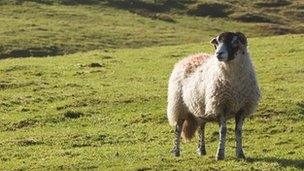Post-Chernobyl disaster sheep controls lifted on last UK farms
- Published

Restrictions covering sheep movements after the Chernobyl nuclear disaster have finally been lifted from all farms in England and Wales after 26 years.
After the 1986 disaster, the Food Standards Agency (FSA) placed controls on 9,800 UK farms, but these were gradually removed.
The final eight in Cumbria and the last 327 in Wales are now free of them.
Adam Briggs, from the NFU, said it meant an end to the "sorry situation" of the Chernobyl legacy.
As a result of the explosion, radioactive particles became locked in upland peat and accumulated in grazing sheep.
'Eat with confidence'
Under the "mark and release" restrictions, the animals had to be tested for levels of Caesium-137 prior to being moved down from the fells for sales.
Farmers were paid £1.30 per animal, to compensate for the cost of holding them before monitoring.
The controls were lifted in Northern Ireland in 2000 and in Scotland in 2010.
Adam Briggs, policy advisor for the NFU in the North West, said: "I've spoken to a number of farmers in the area and they are all very happy with the decision.
"It gives them a bit of flexibility of when they can market the stock.
"The main thing is that research shows the meat is safe.
"People can now eat Cumbrian lamb with confidence."
- Published22 March 2012
- Published26 April 2006